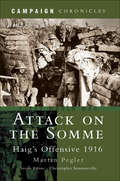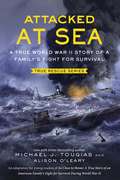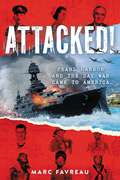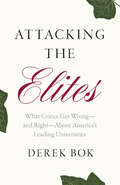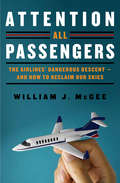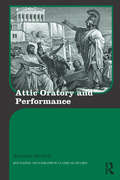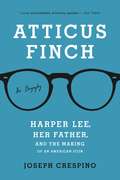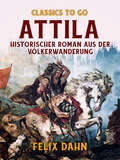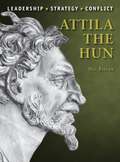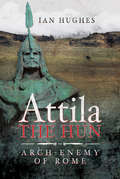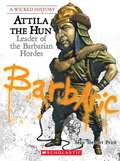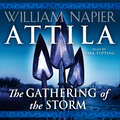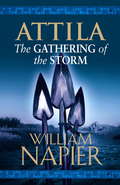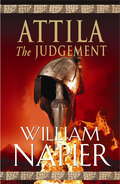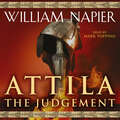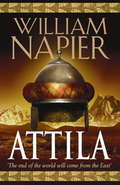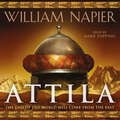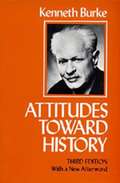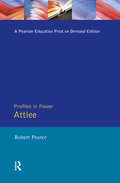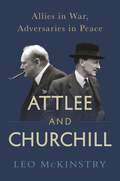- Table View
- List View
Attack on the Somme: Haig's Offensive 1916 (Campaign Chronicles)
by Martin PeglerThe Battle of the Somme is fixed in the country's collective memory as a disaster—probably the bloodiest episode in the catalogue of futile offensives launched by the British on the Western Front. Over five months of desperate fighting in 1916 the British wrestled with the Germans for control of a narrow strip of innocuous French countryside. When the fighting petered out the British had barely pushed back the Germans from their original positions for a combined casualty figure of over a million men. But after 80 years this notorious episode in western military history deserves to be reassessed.Previously unpublished eyewitness accounts are used to give a fascinating first-hand view of the immediate experience of the fighting. As Martin Pegler shows, a revision in our assessment of the Somme, in particular of the tactics and the weaponry employed by the combatants, is overdue, and he challenges the traditional assumptions about the course of the battle and its future impact on the development of warfare.
Attacked at Sea: A True World War II Story of a Family's Fight for Survival (True Rescue Series)
by Michael J. Tougias Alison O'LearyA riveting WWII account of survival at sea—Book 4 in the middle grade True Rescue series from Michael J. Tougias, the author of the New York Times bestseller The Finest Hours. <P><P>On May 19, 1942, during WWII, a U-boat in the Gulf of Mexico stalked its prey fifty miles from New Orleans. The submarine set its sights on the freighter Heredia. Most onboard were merchant seamen, but there were also civilians, including the Downs family: Ray and Ina, and their two children. Fast asleep in their berths, the Downs family had no idea that two torpedoes were heading their way. When the ship exploded, chaos ensued—and each family member had to find their own path to survival. This inspiring historical narrative tells the story of the Downs family as they struggle against sharks, hypothermia, blinding oil, drowning, and dehydration in their effort to survive the aftermath of this deadly attack off the American coast.
Attacked!: Pearl Harbor and the Day War Came to America
by Marc FavreauThe true story of Pearl Harbor as you&’ve never read it before—action-packed, informative, and told through the eyes of a diverse group of people who experienced the terror of the unprecedented attack firsthand. A single day changed the course of history: December 7, 1941. Nobody in America knew Japan&’s attack on Pearl Harbor was coming. Nobody was prepared for the aftermath. It became a defining moment from which the country never truly recovered. Perfect for fans of Steve Sheinkin and Deborah Heiligman, this unflinching narrative puts readers on the ground in Pearl Harbor through the stories of real people who experienced the attack and its aftereffects. It alternates between the sweeping views and fateful decisions of leaders such as FDR and on-the-ground accounts from soldiers and sailors of all backgrounds as well as an array of other unique participants and observers. Attacked! sheds new, compelling light onto a history we think we know, what it means to be American, and the enduring lessons from an event we never saw coming.
Attacking the Elites: What Critics Get Wrong—and Right—About America's Leading Universities
by Derek BokA former Harvard president reflects on how elite universities are responding to critiques from the left and the right, and how they can do better &“In this evenhanded and pragmatic text, Bok presents an all-too-rare moderate perspective on a system as ravaged by extremes as the society it serves. . . . A skillfully argued study of higher education.&”—Kirkus Reviews Elite American universities, such as Yale, Harvard, and Princeton, are admired throughout the world. They attract highly qualified applicants, and most of their graduates go on to lead successful lives. Scholars and researchers at elite universities contribute to knowledge that benefits the public in countless ways, from the discovery of ancient texts to breakthroughs at the forefront of medical technology. These same elite institutions, however, are beset by criticism from both sides of America&’s ideological divide. Liberals press them to enroll more low-income students and to use their reputations and endowments to induce corporations to adopt more just, equitable, and environmentally sound policies. Conservative politicians accuse the universities&’ predominantly liberal faculty of indoctrinating students. The Supreme Court has recently prohibited universities from giving preference to Black and Hispanic applicants for admission, sparking a wider debate over the policies of elite universities in choosing their student body. Drawing on over fifty years of experience as a student, professor, dean, and president of Harvard University, Derek Bok examines the current disputes involving admissions, diversity, academic freedom and political correctness, curriculum and teaching, and even athletics in order to determine which complaints are unsubstantiated, which are valid, and how elite universities can best respond to their critics.
Attention All Passengers: The Airlines' Dangerous Descent—and How to Reclaim Our Skies
by William J. McGeeA Fast Food Nation for the airline industry, Attention All Passengers is a shocking and important exposé revealing the real state of the “friendly skies” in which we fly. Award-winning Consumer Reports travel journalist William McGee, a former editor of the Consumer Reports Travel Letter, spent nearly seven years in airline flight operations management, and what he learned was less than uplifting. From TSA power grabs and an endemic lack of oversight to legislative battles and lobbying boondoggles to antiquated flight patterns and outsourced maintenance workers, the airlines and the Government are in cahoots, conspiring to turn a profit any way they can, no matter who has to pay the price. A provocative and hard-hitting call to action, Attention All Passengers will explode all our previous misconceptions about the airline industry.
Attention, Shoppers!: American Retail Capitalism and the Origins of the Amazon Economy (Princeton Studies in American Politics)
by Kathleen ThelenHow large American retailers outgrew the capacity of government to regulate themThe United States is widely recognized as the quintessential consumer society, one where huge companies like Walmart and Amazon are famous for enticing customers with cheap goods and speedy delivery. Attention, Shoppers! traces the origins and evolution of American retail capitalism from the late nineteenth century to today, uncovering the roots of a bitter equilibrium where large low-cost retailers dominate and vast numbers of low-income families now rely on them to make ends meet.Offering a comparative perspective on the history of American political economy, Kathleen Thelen shows how large-scale retailers in the United Kingdom, Germany, Denmark, and Sweden faced a far less hospitable regulatory environment than companies in the United States, which enjoyed judicial forbearance and often active government support. As American companies grew in scale and scope, they assembled an ever-expanding political coalition that could be weaponized to head off regulatory efforts, leveraging their market strength to squeeze suppliers and workers and even engaging in outright rule breaking when they encountered resistance.Placing the rise of the Amazon economy in a broader comparative-historical context, Attention, Shoppers! reveals how large discount retailers have successfully exploited a uniquely permissive regulatory landscape to create a shopper&’s paradise built on cheap labor and mass consumption.
Attic Oratory and Performance (Routledge Monographs in Classical Studies)
by Andreas SerafimIn a society where public speech was integral to the decision-making process, and where all affairs pertaining to the community were the subject of democratic debate, the communication between the speaker and his audience in the public forum, whether the law-court or the Assembly, cannot be separated from the notion of performance. Attic Oratory and Performance seeks to make modern Performance Studies productive for, and so make a significant contribution to, the understanding of Greek oratory. Although quite a lot of ink has been spilt over the performance dimension of oratory, the focus of nearly all of the scholarship in this area has been relatively narrow, understanding performance as only encompassing 'delivery' – the use of gestures and vocal ploys – and the convergences and divergences between oratory and theatre. Serafim seeks to move beyond this relatively narrow focus to offer a holistic perspective on performance and oratory. Using examples from selected forensic speeches, in particular four interconnected speeches by Aeschines (2, 3) and Demosthenes (18, 19), he argues that oratorical performance encompassed subtle communication between the speaker and the audience beyond mere delivery, and that the surviving texts offer numerous glimpses of the performative dimension of these speeches, and their links to contemporary theatre.
Atticus Finch: The Biography
by Joseph CrespinoWho was the real Atticus Finch? A prize-winning historian reveals the man behind the legend The publication of Go Set a Watchman in 2015 forever changed how we think about Atticus Finch. Once seen as a paragon of decency, he was reduced to a small-town racist. How are we to understand this transformation? In Atticus Finch, historian Joseph Crespino draws on exclusive sources to reveal how Harper Lee's father provided the central inspiration for each of her books. A lawyer and newspaperman, A. C. Lee was a principled opponent of mob rule, yet he was also a racial paternalist. Harper Lee created the Atticus of Watchman out of the ambivalence she felt toward white southerners like him. But when a militant segregationist movement arose that mocked his values, she revised the character in To Kill a Mockingbird to defend her father and to remind the South of its best traditions. A story of family and literature amid the upheavals of the twentieth century, Atticus Finch is essential to understanding Harper Lee, her novels, and her times.
Attila Historischer Roman aus der Völkerwanderung (Classics To Go)
by Felix DahnAttila († 453) war von 434 (als Mitherrscher zusammen mit seinem Bruder Bleda) bzw. 444/45 (als Alleinherrscher) bis zu seinem Tod „König“ (rex) des Kriegerverbandes der Hunnen. Zentrum seines Machtbereichs war das Gebiet des heutigen Ungarns, wo die Hunnen im 5. Jahrhundert ein kurzlebiges Reich errichteten, das unter Attila die größte Machtentfaltung erlebte, aber bereits kurz nach seinem Tod wieder zusammenbrach. (Wikipedia)
Attila the Hun
by Nic Fields Steve NoonAttila the Hun is one of the iconic figures of history. In a series of epic campaigns dating from the AD 430s till his death in AD 453 he ravaged first the Eatsern Roman Empire and later the Western Roman Empire, invading Italy itself in AD 452 threatening Rome itself.The Huns had moved into Europe in the AD 370s, annexing the territory of the Alans and settling in the Danube region. In AD 433 Rua King of the Huns, died. Rua, an ally of Aetius and the West Romans, was succeeded by his nephews Bleda and Attila. When Attila murdered his brother and ruled alone things began to change. In two campaigns against the Eastern Empire (AD 441-42 and 447) the Huns devastated the Balkans and exacted a heavy tribute. In AD 450 Attila turned his attention to the West. When Attila crossed the Rhine he met very little resistance. Some towns opened their gates to him, others were captured and sacked including Trier, Metz and Reims. Attila's strategy was to keep moving, thereby reducing his logistical problems and, by his devastation of Roman Gaul, force the Western Empire to come to terms with him. He met his major setback at the battle of Chalons in AD 451, also known as the battle of Campus Mauriacus or Catalaunian Plains, when the Roman warlord Flavius Aetius cobble together a hodgepodge force of Visigoths, Franks, Burgundians, Alans, Saxons, Armorican Britons and Romans who together they managed to drive Attila the Hun out of France by defeating his equally mixed army of Huns, Ostrogoths, Gepids, Franks, Rugians, Thuringians, Burgundians.Despite this setback, Attila invaded Italy the following year, sacking and razing the cities of Aquileia, Vicetia, Verona, Brixia, Bergamum and Milan. Having retired to his Carpathian heartland, Attila died in AD 453 and his empire did not long survive him.This new study explores his extraordinary conquests and the abilities that led him to his establish such a far-flung empire.
Attila the Hun: Arch-Enemy of Rome
by Ian HughesA biography of the notorious tribal leader whose empire challenged the Romans. Most know the name Attila the Hun—but few are familiar with the full history behind this historical figure. Rising to the Hunnic kingship around 434, he dominated European history for the next two decades. Attila bullied and manipulated both halves of the Roman Empire, forcing successive emperors to make tribute payments or face invasion. Here, Ian Hughes recounts Attila&’s rise to power, attempting to untangle his character and motivations so far as the imperfect sources allow. A major theme is how the two halves of the empire finally united against Attila, prompting his fateful decision to invade Gaul and his subsequent defeat at the Battle of the Catalaunian Plain in 451. Integral to the narrative is analysis of the history of the rise of the Hunnic Empire; the reasons for the Huns&’ military success; relations between the Huns and the two halves of the Roman Empire; Attila&’s rise to sole power; and Attila&’s doomed attempt to bring both halves of the Roman Empire under his dominion.
Attila the Hun: Leader of the Barbarian Hordes
by Sean Stewart PriceChildren's biography of Attila the Hun, who led the Huns against the mighty Roman Empire, which had dominated Europe for centuries.
Attila: The Gathering of the Storm
by William NapierThe gripping and bloody story of one of history's most infamous and enigmatic villains - part II in the ATTILA trilogyThe 5th century has dawned in blood. The young boy exiled thirty years ago has grown into a man. One stormy autumn day, a mysterious rider is seen out on the plains. Attila has returned, his sentence served, to claim his kingdom. He will ride out at the head of no more than one hundred chosen men, driven by the ambition to unite all the feuding Hunnish and Scythian tribes under single banner and a single king. An impossible ambition. For Attila and his chosen men must triumph over blizzards and deserts, bandit kings and hidden mountain kingdoms, and furious battle with the terrible Kutrigur Huns. But all will flock to his banner, answer his call. His power is mysterious and inexpressible, his strength of character and iron will cannot be opposed. And far to the west lies a promised empire both fabulously wealthy and tottering to its knees. An empire full of gold and silver and dark-eyed slavegirls - the Empire of Rome. And this strange horde from out of the Scythian wilderness will bring a night to fall on that Empire like no other¿
Attila: The Gathering of the Storm (Attila Ser. #2)
by William NapierThe gripping and bloody story of one of history's most infamous and enigmatic villains - part II in the ATTILA trilogyThe 5th century has dawned in blood. The young boy exiled thirty years ago has grown into a man. One stormy autumn day, a mysterious rider is seen out on the plains. Attila has returned, his sentence served, to claim his kingdom. He will ride out at the head of no more than one hundred chosen men, driven by the ambition to unite all the feuding Hunnish and Scythian tribes under single banner and a single king. An impossible ambition. For Attila and his chosen men must triumph over blizzards and deserts, bandit kings and hidden mountain kingdoms, and furious battle with the terrible Kutrigur Huns. But all will flock to his banner, answer his call. His power is mysterious and inexpressible, his strength of character and iron will cannot be opposed. And far to the west lies a promised empire both fabulously wealthy and tottering to its knees. An empire full of gold and silver and dark-eyed slavegirls - the Empire of Rome. And this strange horde from out of the Scythian wilderness will bring a night to fall on that Empire like no other¿
Attila: The Gathering of the Storm (Attila Ser. #2)
by William NapierThe gripping and bloody story of one of history's most infamous and enigmatic villains - part II in the ATTILA trilogyThe 5th century has dawned in blood. The young boy exiled thirty years ago has grown into a man. One stormy autumn day, a mysterious rider is seen out on the plains. Attila has returned, his sentence served, to claim his kingdom. He will ride out at the head of no more than one hundred chosen men, driven by the ambition to unite all the feuding Hunnish and Scythian tribes under single banner and a single king. An impossible ambition. For Attila and his chosen men must triumph over blizzards and deserts, bandit kings and hidden mountain kingdoms, and furious battle with the terrible Kutrigur Huns. But all will flock to his banner, answer his call. His power is mysterious and inexpressible, his strength of character and iron will cannot be opposed. And far to the west lies a promised empire both fabulously wealthy and tottering to its knees. An empire full of gold and silver and dark-eyed slavegirls - the Empire of Rome. And this strange horde from out of the Scythian wilderness will bring a night to fall on that Empire like no other¿
Attila: The Judgement
by William NapierThe battlefields run with blood in this gripping finale to the bestselling Attila trilogy.The infamous leader of the Huns stills thirsts for blood and supremacy as he crosses the Danube and prepares to attack the Western Empire and face once more his boyhood friend-turned-foe: Aetius the Roman.For Attila is set on a plan that will take him right through the entire Italian peninsular and up to the gates of Rome. He must weigh up whether he should attack this, the greatest of cities, or whether the gamble is too high, even for the most battle-hardened of warlords. In this tumultuous conclusion to the life of the warrior, we see the biggest choices of his blood-soaked career played out, and travel with him right into the silken tent where Attila must ultimately face his destiny.
Attila: The Judgement
by William NapierThe battlefields run with blood in this gripping finale to the bestselling Attila trilogy. The infamous leader of the Huns stills thirsts for blood and supremacy as he crosses the Danube and prepares to attack the Western Empire and face once more his boyhood friend-turned-foe: Aetius the Roman.For Attila is set on a plan that will take him right through the entire Italian peninsular and up to the gates of Rome. He must weigh up whether he should attack this, the greatest of cities, or whether the gamble is too high, even for the most battle-hardened of warlords. In this tumultuous conclusion to the life of the warrior, we see the biggest choices of his blood-soaked career played out, and travel with him right into the silken tent where Attila must ultimately face his destiny.
Attila: The Judgement (Attila Ser. #3)
by William NapierThe battlefields run with blood in this gripping finale to the bestselling Attila trilogy.The infamous leader of the Huns stills thirsts for blood and supremacy as he crosses the Danube and prepares to attack the Western Empire and face once more his boyhood friend-turned-foe: Aetius the Roman.For Attila is set on a plan that will take him right through the entire Italian peninsular and up to the gates of Rome. He must weigh up whether he should attack this, the greatest of cities, or whether the gamble is too high, even for the most battle-hardened of warlords. In this tumultuous conclusion to the life of the warrior, we see the biggest choices of his blood-soaked career played out, and travel with him right into the silken tent where Attila must ultimately face his destiny.
Attila: The Scourge Of God (Attila Ser. #3)
by William NapierA stunning historical novel - the first in an epic trilogy about the rise and fall of one of history's greatest villains.The dawn of the fifth century AD, and the Roman Empire totters on the edge of the abyss. Already divided into two, the Imperium is looking dangerously vulnerable to her European rivals. The huge barbarian tribes of the Vandals and Visigoths sense that their time is upon them. But, unbeknown to all of these great players, a new power is rising in the East. A strange nation of primitive horse warriors has been striking terror upon border peoples for fifty years. But few realise what is about to happen. For these so called 'Huns' now have a new leader. His name is Attila - 'the Scourge of God'.Thus begins a saga of warfare, lust and power which brings the whole of the Christian world to its knees - and ends in blood on the fields of France. It is a story of two men: Attila the Hun and Aetius the Roman. One who wanted to destroy the world, and one who fought one final battle to save it...
Attila: The Scourge of God
by William NapierA stunning historical novel - the first in an epic trilogy about the rise and fall of one of history's greatest villains.The dawn of the fifth century AD, and the Roman Empire totters on the edge of the abyss. Already divided into two, the Imperium is looking dangerously vulnerable to her European rivals. The huge barbarian tribes of the Vandals and Visigoths sense that their time is upon them. But, unbeknown to all of these great players, a new power is rising in the East. A strange nation of primitive horse warriors has been striking terror upon border peoples for fifty years. But few realise what is about to happen. For these so called 'Huns' now have a new leader. His name is Attila - 'the Scourge of God'.Thus begins a saga of warfare, lust and power which brings the whole of the Christian world to its knees - and ends in blood on the fields of France. It is a story of two men: Attila the Hun and Aetius the Roman. One who wanted to destroy the world, and one who fought one final battle to save it...
Attila: The Scourge of God (ATTILA)
by William NapierA stunning historical novel - the first in an epic trilogy about the rise and fall of one of history's greatest villains.The dawn of the fifth century AD, and the Roman Empire totters on the edge of the abyss. Already divided into two, the Imperium is looking dangerously vulnerable to her European rivals. The huge barbarian tribes of the Vandals and Visigoths sense that their time is upon them. But, unbeknown to all of these great players, a new power is rising in the East. A strange nation of primitive horse warriors has been striking terror upon border peoples for fifty years. But few realise what is about to happen. For these so called 'Huns' now have a new leader. His name is Attila - 'the Scourge of God'.Thus begins a saga of warfare, lust and power which brings the whole of the Christian world to its knees - and ends in blood on the fields of France. It is a story of two men: Attila the Hun and Aetius the Roman. One who wanted to destroy the world, and one who fought one final battle to save it...
Attitudes Toward History
by Kenneth BurkeThis book marks Kenneth Burke's breakthrough in criticism from the literary and aesthetic into social theory and the philosophy of history. In this volume we find Burke's first entry into what he calls his theory of Dramatism; and here also is an important section on the nature of ritual.
Attitudes and Decisions (Psychology Revivals)
by J Richard Eiser Joop van der PligtThe concept of attitude has long been a central part of social psychological theories. It is important in other disciplines too, such as economics, business studies, politics and sociology. Originally published in 1988, the authors of this text show how attitudes and motives are crucial in human decision-making, and explore the relationship between them. They look closely at the real context of people’s attitudes and behaviour, pointing out that attitudes are both a social product and an intrinsic part of social action. The authors show that theories of judgment, attitudes, attribution and decision-making can make important contributions to social issues such as the employment of nuclear energy, the storage of nuclear waste, health behaviour and medical decision-making. They emphasize that social psychology is relevant to a wide variety of social issues, deriving from the theoretical and distinctive methods that social psychology has developed.
Attlee (Profiles In Power)
by Robert PearceAttlee is undoubtedly one of the key figures in modern British history. An important figure in Churchill's War Cabinet, and premier of the first majority Labour Government, he created the Welfare State, nationalised a substantial part of industry and secured the independence of India. Yet his political stature remains unresolved. Was he Churchill's "modest man with much to be modest about" who squandered the fruits of victory, or, as many now claim, one of the truly great prime ministers? Robert Pearce's lucid and drily amusing study goes behind the stern exterior to find ambition and indecision, and a uniquely moral vision.
Attlee and Churchill: Allies in War, Adversaries in Peace
by Leo McKinstryThroughout history there have been many long-running rivalries between party leaders, but there has never been a connection like that between Clement Attlee and Winston Churchill, who were leaders of their respective parties for a total of thirty-five years. Brought together in the epoch-making circumstances of the Second World War, they forged a partnership that transcended party lines, before going on to face each other in two of Britain's most important and influential general elections. Based on extensive research and archival material, Attlee and Churchill provides a host of new insights into their remarkable relationship. From the bizarre coincidence that they shared a governess, to their explosive wartime clashes over domestic policy and reconstruction; and from Britain's post-war nuclear weapons programme, which Attlee kept hidden from Churchill and his own Labour Party, to the private correspondence between the two men in later life, which demonstrates their friendliness despite all the political antagonism, Leo McKinstry tells the intertwined story of these two political titans as never before.In a gripping narrative McKinstry not only provides a fresh perspective on two of the most compelling leaders of the mid-twentieth century but also brilliantly brings to life this vibrant, traumatic and inspiring era of modern British history.
